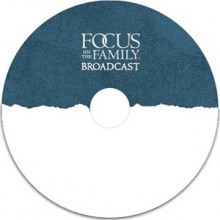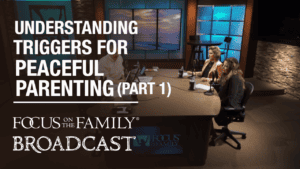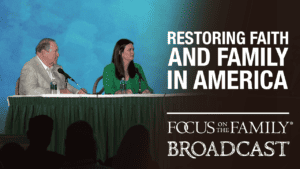John Fuller: Today on Focus on the Family, we’re returning to a conversation we started last time about communication-
Jim: (laughs)
John: … and how we can learn to do it, uh, well and better. Your host is Focus president and author Jim Daly, and I’m John Fuller.
Jim Daly: John, let’s try a few of these lines. “I’m sorry you find communicating so difficult. Next time I’ll read your mind.” Have you ever said that?
John: Oh. (laughs) No, I… Have I heard that a time or two as well. Uh, how about, “Communication, it’s best to pretend people are actually listening to you.”
Jim: (laughs) Here’s a zinger. “Romeo and Juliet is just another example of why communication within a relationship is so important.” (laughs)
John: It doesn’t always end well. (laughs)
Jim: Yeah, I guess so.
John: And, uh, George Bernard Shaw observed that the single biggest problem in communication is the illusion that it has taken place.
Jim: (laughs) I mean that is so true in marriage. Uh, I think we’ve established that communication can be difficult at times. Would you agree?
John: Uh, yes.
Jim: (laughs)
John: And we think it goes better than it does, oftentimes.
Jim: And let’s just say it this way. If you don’t believe me, just get married, and then if you still don’t believe me, have children.
John: Oh. (laughs) That’s the proven ground.
Jim: And that, that’ll show the communication deficit. Our guest, uh, last time and today is Dr. Mike Bechtle and he’s done a lot of research and coaching about better ways to interact with other people and how to express ourselves more effectively. And Jean is just so happy that Mike is here today. (laughing) But, uh, you know, even though Mike works full-time doing this, he is very, uh, critical of himself about his own inadequacies in communication, which I love about Mike. That’s a good expert when he can recognize his own foibles, right? And he shared last time how good communication doesn’t happen naturally. We need to work at it, probably like working out a muscle here or there. And especially in today’s social media world, we touched on that last time, where everybody seems to just squawk and not really be listening to anybody else.
John: Mm.
Jim: If you’ve ever felt like you could communicate better or wonder why people don’t understand what you’re trying to tell them, today’s program’s for you.
John: And that is me you’re speaking to. It, indeed.
Jim: It is. (laughs)
John: I think all of us feel like we can improve and as we mentioned last time, Dr. Bechtle has, uh, written a book that captures his research, his thoughts, his experiences regarding communication. It’s called It’s Better to Bite Your Tongue Than Eat Your Words: The No Regrets Guide to Better Conversations. And of course, we have that here at focusonthefamily.com/broadcast or just give us a call.
Jim: Mike, welcome back to Focus.
Mike Bechtle: Thanks for the opportunity.
Jim: (laughs) It’s good to have you. So let’s communicate. (laugh) You’re supposed to say something, Mike.
Mike: Can I, I’m nodding my head. Doesn’t that count? (laughing)
John: Non-verbals do count, don’t they?
Jim: Okay, let’s, uh, let’s, uh, move on from here. (laughing) Listen, let’s start with, uh, today’s discussion by looking at the power of words. I mean, people talk about this, the Bible talks about this, that the power, life, and death is in the tongue. We mentioned that last time. Uh, we could be pretty casual, uh, about the words we use, probably the most casual that I’m using my words unwisely is in my marriage.
John: Mm.
Jim: I’ll say something to Jean, just to maybe push a button, and I would imagine you would say, “That’s really not very smart, Jim.” So in that context, w- w- why is that such a danger? (laughs)
Mike: It’s a danger because, especially in a marriage context, because we use so many words. We’re there for so long. The longer you’ve been married, when you’re first dating, you behave yourself and you say words that you’re trying to impress them or get them to like you and it grows and finally you marry the person, and then you don’t have quite-
Jim: The same vocabulary.
Mike: You don’t have the sa- well, you add to your vocabulary.
Jim: Okay. (laughs)
Mike: And then (laughs) you’re able to use words, but sometimes you’re just tired and you say something and it’s just not as healthy as it could be otherwise, or it’s not as affirming, or it doesn’t build the other person up. When I look at a verse like Ephesians 4:29 that says, “Don’t say anything that doesn’t build up,” that’s the characteristic of everything we do and I think especially in a marriage, we just have so many conversations over the years, it’s easy to just be in a place where we forget to use cautious words.
Jim: Mm.
Mike: Or healing words.
Jim: Mike, you have an illustration in the book about your wife who dropped something on the driveway and it, it led to quite a powerful story.
Mike: It, we, we had, we’re first married and we were living in a house that was built in 1920 in Redondo Beach, California, and it had an old driveway with two cement strips that-
Jim: That your tires would roll on. And the-
Mike: Yes, exact- it was so skinny, we couldn’t get in the garage-
Jim: Right. (laughs)
Mike: … because it was made for like a Model A, for like a Model T.
Jim: Mm.
Mike: And there was a dirt strip down the middle that had… just caked with oil over the years. Who knows what was there. Well, she was a pre-school teacher at the time and she did something with her kids where she popped popcorn and took the lid off, let it fly around the room. The kids were catching it in their little cups.
Jim: (laughs)
Mike: Came home and there was, uh, the popcor- corn spilled in the back of our little, um, Honda station wagon. She opened it up and it spilled on to that driveway. Well, we didn’t think anything of it and about two weeks later, we noticed there it was growing.
Jim: (laughing)
Mike: And then we thought, “Let’s just leave it and see what happens.” And pretty soon there were stalks-
Jim: Wow.
Mike: … and then there were little tiny ears of corn, which it was no way we’re gonna eat them ’cause who knows what’s in that soil that is growing into them.
Jim: Oh, you’re than me. I would’ve eaten it. (laughing)
Mike: You’re putting butter and salt on-
Jim: Yeah. Butter makes it all better.
John: (laughs)
Mike: But, but we, i- i- just the fact that it grew in that kind of a soil to me was a real illustration of the fact that we have our casual words. We say things, they drop on other people, and we think, “That’s not gonna have any impact,” because that person’s hardness or whatever, but you never know what a seed is gonna do in any kind of soil.
Jim: Yeah.
Mike: So we, we need to be very intentional about the words we use in every conversation.
Jim: You know, uh, that intentionality is a great point and I think that’s one of the things that we struggle with. Uh, okay. Let me just say me, not we.
Mike: (laughs)
Jim: But I can tend to struggle with intentionality. I’m a very general speaker, I think. I say a lot of “we” words and not, not as many “I” words, which I think is healthy, but I think oftentimes, uh, I leave, especially in a, in a business or organizational context, I can leave a lot of ambiguity. Uh, someone has told me that’s a leadership style. You’re kinda leaving your exit door open, you know, ’cause you don’t have enough data yet to make a decision, let’s say it that way. So you, you’re a little more vague with your communication-
John: Hm.
Jim: … but, man, I’m telling you one thing I’ve learned, uh, being the president of Focus on the Family, the clearer you can be in a meeting and communicating, it’s really helpful to the team around you ’cause now we really know what you’re looking for. And s- s- speak to that, that battle about clarity-
John: Hm.
Jim: … in communication.
Mike: Well, it’s so easy to just say what we’re thinking-
Jim: (laughs)
Mike: … and not be intentional about it because w- in any conversation, if we’re in a meeting, to realize that people… Especially if you’re the leader, people are listening closely to what you’re saying and they’ll take a little thing you say and assume that it’s, maybe has more meaning than you actually intended for it. But at the same time, it’s not just in meetings.
Jim: Mm-hmm.
Mike: It’s you’re building trust. You’re building trust with your team, with other people. It’s when you talk to the person at the f- at the, uh, reception desk and you just have a casual moment with them to realize that’s as critical in building trust in you as a leader and in the organization, setting a tone for trust.
Jim: Yeah.
Mike: Think that’s what we’re trying to do with these intentional words is to build people up, build relationships.
Jim: How about the deeper things where it’s not so much directional but things like, “I was wrong.” Or, “Help me better understand.” You know, so much… We do marriage intensives, Hope Restored, and, you know, so much of the training they’re doing for those couples that are in trouble is how to use those kinda words in their relationship to better understand each other. So let me hear you clearly. You said, and, but I don’t know why that it’s so hard for us to do. It’s great communication skills but we don’t tend to use those wisely. Rather we just respond out of our emotion rather than let me better understand what you’re saying about my behavior. (laughing) But I mean, that is the point, right? Let me make sure I hear you clearly. Speak to that more intimate emotional clarity.
Mike: Well I think it comes from not wanting to admit that we’re wrong because d-
Jim: Do we have that problem as humans? (laughs)
Mike: Only, only three or four people, I think. But well, it, it, it’s a matter of strength because normally we say, “Well, that shows weakness and I don’t wanna be weak.” But usually strong people are the ones who are willing to admit their mistakes and that builds trust with other people.
Jim: Huh.
Mike: Weak people are the ones who defend their mistakes or ignore them and that tends to weaken trust. And so in the most important relationships, that’s where being able to s- to admit, “You know what? I was wrong.” And just say it that directly, not to couch it or put-
Jim: Right.
Mike: … a bunch of words around it. Just say, “You’re right. I was wrong.” And it’s huge in building trust, especially in a marriage. The times I have said that I didn’t want to say it but it’s like a- all I had to say was that phrase with honesty and it shows humility. It builds trust because she knew I was being genuine.
Jim: Jean and I, so this is a playful area of our relationship ’cause we’ve gotten to the point when if she says, you know, “You were right. I was wrong.” And I always say, “Oh, could you say that again?” (laughing) And but it’s playful and I do the same for her. “Yeah, I, I was wrong.” “Oh, let me hear that again, Jim.” (laughing) So it’s just a, a good way to defuse some of that energy.
John: Yeah. Mike, you had a whole chapter about silence and, um, that’s a concept I think a lot of us don’t consider as part of communication. So, uh, why is it that silence can have importance in communication?
Mike: Well silence is uncomfortable. If we’re talking-
John: Mm.
Mike: … and all of a sudden nobody says anything, after a couple of seconds with both get a little bit edgy and you might just say something to break the silence. It’s like a vacuum and it sucks words out of you, and that’s why salespeople do it all the time, ’cause they know if they cannot respond to what somebody’s saying, that person will give them more information-
John: Mm.
Mike: … because it’s uncomfortable to just sit there. But it’s silence, especially, especially for an introvert-
Jim: Mm-hmm.
Mike: … is a huge tool because if I don’t feel like I have to press through, there’s times when I’ll say, “Give me a second. I need to think about that.” And that’s all you have to say and I’m not gonna spend the next two minutes thinking about it but if I have five seconds, and then I’ll, I can start my response, it gives me a chance to clarify it. It slows it down and I found that if we get used to that, slowing a conversation down, is one of the easiest ways to make it start working to bring down the emotion in conflict, is slow it down a little bit so it’s not going back and forth.
John: Mm.
Mike: You just have that conversation together. So it’s, silence is a huge resource.
Jim: Kind of in that same direction, John, the, the less is more strategy that you talk about. In fact, you illustrated that with a, I thought, a really good story about a late-night arrival at a airport.
John: Hm.
Mike: We flew into, um, Orange County c- we were going to fly into Orange County, California, which has a curfew, a, a noise curfew at 10:30 at night. Well, the flight was late and so we had to go 40 miles away to Los Angeles International which means they had to get us shuttles and shuttle us back to the other airport.
Jim: Right.
Mike: So it’s midnight and there’s, we’re jammed in this little shuttle, and everybody was tired. Nobody was talking except one person up at the front. And he was trying to share his faith with the driver who h- had no part of it. He wasn’t even responding. But he was, s- he spent 40 minutes just explaining and talking about things and-
Jim: At midnight.
Mike: At midnight, yes.
Jim: Yeah.
Mike: And everybody else in the v- in the van, you could just feel the tension that was happening in there. It changed the dynamic, so.
Jim: Yeah. Yeah. No, I mean, I, I get it. I’ve been in similar situations. You’re going, “Can you just be quiet (laughs) for a minute?” And I’m an extrovert.
John: You are.
Jim: Um, you believe s- silence actually helps us be ourselves, though, before we move on from this silence chapter-
John: (laughs)
Jim: … John, that you kicked off. But, uh, h- how does it help us to be more ourselves, to b- be a little slower, a little more silent? (laughs) I know the answer. I’m asking this almost rhetorically. Go ahead.
Mike: Maybe I should have you give the answer. (laughs)
Jim: No. (laughs) Well, I mean, I kn- I know ’cause it, it’s a area that I struggle in.
Mike: I think it’s be-
Jim: All of it. Less is more. (laughs) Silence is good.
Mike: Well I think it’s, yeah, I think, um, it’s so easy for us. I, I tend to talk in circles. When I, when I don’t know if I’m getting across I’ll keep talking and trying to explain it. Like if you’re not responding facially, it’s like, “Well I don’t know if he’s agreeing. I don’t know if he’s getting it,” so I’ll keep talking and try and, uh, come around different directions.
Jim: How does your wife appreciate that? (laughs)
Mike: She sha- she’s the one that taught me the value of silence.
Jim: Okay, good. (laughing)
Mike: Because of that very (laughs) issue.
Jim: That’s funny.
Mike: Because then, then you’re not posturing. You’re not manipulating. You’re not trying to impress somebody else. You’re just being you. It helps you pay attention and it really strengthens the relationship with the other person.
Jim: Yeah. You know, we’ve, we’ve touched this occasionally, uh, over the last couple of days, but our kind of unintentionality with our communication and conversations, uh, we sometimes don’t have a purpose or an outcome (laughs) in mind. We’re just talking away. Uh, why is that a problem?
Mike: We tend to have conversations without an outcome in mind. If I’m driving from Los Angeles on a family vacation to New York, we’ll plan the route, we know how we’re gonna get there, and then we-
Jim: Wow, that’s a big drive.
John: Yeah.
Jim: (laughs)
Mike: It’s a long vacation. And, (laughs) and when I put the address in the GPS of the Empire State Building, that’s where I’m trying to go. And if the road is closed up ahead, then I don’t have to worry about it. It tells me it’s recalculating and it takes me a different direction. Or maybe I decide to go a different way because it’s more about the scenery or it’s about something else. But I have that goal in mind. I don’t just drive hoping we get someplace.
Jim: Huh, right.
Mike: And so the idea of a personal GPS for our conversations. I don’t have to try to convince you of something and that’s my outcome that I want. It’s what do I want? Do I want to build more trust in this relationship? Do I want to have a c- conversation where I listen more? Do I wanna understand what their position is? Do I wanna just have fun with this person? And so to go into every conversation with the idea of, “So what do I want to happen here?” We do it in every other part of life, so why wouldn’t we do it in our closest relationships?
Jim: Yeah, part of that sounds exhausting to me. (laughs) You know, outcomes-based communication. Like you and I meet at the coffee machine and I’m thinking, “Okay, what outcome do I want here?” That’s already overwhelming to me. I just wanna say, “Hey, Mike. How you doing?”
Mike: Yeah, and f- w- for me, the default setting is I just wanna have a good conversation.
Jim: Yeah.
Mike: And so for those kinda things, I wouldn’t come into it… I already know what the outcome is. It’s like-
Jim: Oh, okay.
Mike: “Let’s just connect.”
Jim: Yeah.
Mike: W- g- Jim, Jim and I get to talk for a couple minutes. That’s a gift.
Jim: Yeah. And, and I think the key for people to hear is it’s not about manipulation ever. Outcome-based communication, you’re just saying, “What do I want at the end of this interaction with this friend, with my spouse, with my kids?” But I’ll tell you, with teenagers, sitting down and talking about things, that’s really critically important. Outcome-based, where do I want this to go? ‘Cause if I’m not-
John: Mm.
Jim: … staring at or guiding it, it can go in places I don’t want it to go.
Mike: Well and that’s a, that’s a great example because when I think about we’re talking with teenagers, I would call that a high-stakes conversation. There’s a lot at stake there and so I want to approach it with the idea of not just going in, seeing how it goes, because I have a goal for this teenager. I want them to turn into a mature adult. That’s what… I’m not raising kids, I’m raising adults.
Jim: Right.
Mike: And so I wanna prepare them, every conversation, those are probably the most important conversations I have in my life.
John: Mm.
Jim: I agree.
John: Yeah. Well we’re talking today with Dr. Mike Bechtle on Focus on the Family with Jim Daly. And, uh, we have copies of his book, It’s Better to Bite Your Tongue Than Eat Your Words. Uh, give us a call for your copy, 800-A-FAMILY, or stop by focusonthefamily.com/broadcast.
Jim: Uh, Mike, when people struggle to communicate well, they may think, “I need to say more.” And I’m not, I don’t know where I’d get this idea, (laughing) but.
John: Guilty as charged. (laughs)
Jim: But and maybe we even add, “Let’s even say it more loudly.”
John: Oh. Hm.
Jim: Isn’t it funny when we’re speaking to somebody who e- English is not their first language? I experience this, uh, traveling internationally. What, (laughs) what you do, I don’t know why we do this as human beings. So the person doesn’t know English so we talk louder at them. I said, “Where’s the train station?”
Mike: (laughs)
Jim: Right? And they’re… It’s just so funny, like as if they’re, they can’t hear.
John: Mm-hmm.
Jim: And, uh, I guess it’s wrapped up in there. What’s wrong (laughs) with the approach of just say more and say it more loudly?
Mike: Well that’s what we do with our teenagers. We do it with anybody-
Jim: (laughs)
Mike: … we’re close to. When there’s emotion-
Jim: So true.
Mike: … if th- if we say something and they don’t respond the way we want them to, we tend to say it in different ways, we get firmer, we get louder, and the conversation actually becomes m- less effective-
John: Mm.
Mike: … instead of more effective.
John: Yeah, that happens in marriage, too. I was just, just the other day Dena and I were talking and I was very aware that my voice was escalating.
Jim: It, it doesn’t, John. That’s unique to you. (laughs)
John: Uh, oh, I know it is, too, so. (laughing) I actually said, “Time out ’cause I’m feeling something here. I need a moment to regroup and I’ll come back to it, I promise.” But I, I was very aware that I was getting loud, like I am kinda right there. (laughing)
Jim: No, I get it.
John: So I’m still feeling it.
Jim: I mean, it’s so, you can almost categorize communication by the relationship type.
John: Yeah.
Jim: Like with your spouse it’s a certain way.
John: Hm.
Jim: With your children it’s another way, and with your friends it’s an entirely different way, right? How many people have thought, “You know, I should talk to my wife the way I talk to my neighbor.”
John: Mm.
Jim: Which is typically maybe kinder, more gentle, a little softer.
John: Mm.
Jim: A little more understanding. I mean, if anybody deserves that kinda communication-
John: My spouse deserves that, yeah.
Jim: … it’s your spouse first, right?
Mike: I think it’s a big thing that happens in marriage. After a certain period of time it occurs to you that you’re being nicer to other people than you are to your spouse.
Jim: Oh, so true. Um, e- y- explain why you believe asking questions… e- e- Jesus did this profoundly, right? But why asking questions is, A, overlooked and, B, so effective?
Mike: I don’t have the exact number in front of me but I read recently that Jesus asked, I think it was around 314 questions in the New Testament. He answered four.
Jim: Wow. (laughs)
Mike: And so he asked questions as a tool of communication.
Jim: Yeah.
Mike: It was just the way he did it.
Jim: That’s amazing.
Mike: And I think about other people, the way we talk to them. It’s so easy for us to say, “I need to have more things to say. I need to be fluent in this, or I need to have lots of ideas or lots of things to talk about.” But if I don’t have a lot of things to talk about, if I ask you a question, all I have to do is listen and then draw from what you said. And one of the easiest ways to do that is I ask you a question, let you respond, and then my next question is some version of, “Tell me more.”
Jim: Right.
Mike: “Tell me about that.” Bec-
Jim: That goes back to that point of, “Let me, let me make sure I’m hearing you right.”
Mike: Yes. Yes.
Jim: Blah, blah, blah, blah, right? It-
Mike: I mean you-
Jim: It’s engagement.
Mike: Well, yeah. You hear it in the marriage conferences and things but it’s huge in any conversation because it shows you were listening, it shows you care, and it lets them have the opportunity to go a little deeper. Now you’ve got more things to explore.
Jim: Yeah. You know, making that comment about Jesus. I mean, we have to remember the context. He’s God.
John: Mm.
Jim: I mean he is the creator of the universe and think of the humility that he’s expressing in that, asking his creation, you know, “So what do you think about that?” (laughs) I mean it, when you look at it like that, that’s an amazing perspective-
John: Yeah.
Jim: … to think that the God of the universe came in h- in flesh, A, to pay for our sins and to, you know, pave the way for our salvation and for eternity. I mean, that’s the basic premise of Christianity. But the expression of humility in that.
John: Mm.
Jim: “Oh, let, let me ask you a question.” I mean, He already knows your answer.
John: Yeah. Yeah.
Jim: I mean, speak to that idea of humility in communication, what God was showing us asking over 300 questions while he went through the New Testament with us.
Mike: What I think is interesting is that if anybody could focus on talking it would be Him ’cause he knows all the answers.
Jim: Right. (laughs)
Mike: He has plenty of stuff to talk about and if communication was all about talking and presenting our positions, He would’ve done more of it. But the fact that He asked so many questions, I think it’s a very humble thing to not just put that out there and show how much knowledge He had. He was investing in other people. He was caring about other people.
Jim: Mm.
Mike: And that’s why talking less, I think, is one of the… You, you mentioned less is more. Talking less is one of the biggest skills you can have. In fact, they say that’s… If, if you want people to think you’re smart, you should just stop talking.
Jim: Right.
Mike: Because even, uh, Solomon in Proverbs 17:28 said, “Even a fool who keeps silent is considered wise. When he closes his lips he’s deemed intelligent.” Well, that’s kind of a backdoor way of saying things but humility is to recognize, and, and it’s a tough one, because as soon as you feel like you have it, you probably have gotten some pride now. It just disappeared. But to go into a relationship saying, “I don’t have to run this thing. I don’t have to be with the one with all the answers. I just wanna care. I wanna share. I wanna be part of your life and just, just, just listen.”
Jim: Yeah. Let’s hit the, uh, i- idea of humble bragging that you mentioned in the book.
John: Mm-hmm.
Jim: I’m thinking of a pretty popular comedian, Brian Regan. He’s pretty clean. I, j- Jean and I and the boys have listened to his humor. It’s very funny. And one of the things he… a skit that he does is I Walked on the Moon and it’s about encountering at a dinner party the me monster, the guy who says, “Yeah, I’ve got 14 cars and I’ve driven the Autobahn and my company is international company and I own this, that, and the other thing.” And he says, “Wouldn’t it be great to be one of the 12 guys that walked on the moon (laughs) and you just dip in your potato chip and take that bite and go, ‘I walked on the moon.’ It’s kinda like a party stopper.”
John: (laughs) Top that.
Mike: And you do it very.
Jim: (laughs) That’s kinda like the Lord, right? “Oh, I created you.” (laughs) It’s one of those things. But speak to the humble bragging person. Well, (laughs) speak to that environment, to both the humble bragger and the listener.
Mike: The first time I heard that term was an, a human resources, uh, professional that I was talking to and I asked her once, I said, “What keeps people from getting jobs when you interview them? What’s the number one thing?” And she said, “Honestly, it’s humble bragging.” And I said, “What’s that?” She says, “‘Cause you wanna have somebody, they all have the skills, but w- you want somebody you’re going to enjoy working with. And I’ll ask him the question a lot of times, ‘What’s your, what’s one of your greatest faults?'”
Jim: (laughs)
Mike: “And they’ll say something like, ‘Well, I have trouble working with a team sometimes because I’m such a perfectionist.'”
Jim: (laughs)
Mike: And it’s like it’s a backdoor-
Jim: Yeah.
Mike: … way of saying, “I’m s-”
Jim: I’m pretty good.
Mike: “I’m so good at this and it’s hard for me to, uh, to keep regular hours because I’m just so committed to getting stuff done.” So it, and it, it, I think it’s real easy to slip in when we have something we could brag about, but to, like you said, to drop it in when you’re eating the chips-
Jim: Right. (laughs)
Mike: … just a little thing, a casual comment to let them know something, it’s like… And the, and the question I always ask there is, “Do they need to know that? I- is it really that important or is it just something to make me look better?”
John: Mm.
Jim: That’s gotta be one of the all-time best, though, that I walked on the moon. (laughing)
John: Hard to top that, yeah.
Jim: Yeah, I just, I think that’s so funny. Mike, this has been so good. Um, let me, let me close with this question. Uh, you share a story about playing Scrabble with an 88-year-old woman who spoke English as her second language. (laughs) Y- everybody jumps in on that. “I can, I’ll, I’ll win this. This is gonna be great. This old German woman.” I’m not sure if she was German, but I’ll go with it. How did that, uh, experience go? How did the game go? What were your expectations and what were the outcomes?
Mike: Well, this was my son-in-law’s mother-in-law.
Jim: Okay.
Mike: And so, I had, um, we played, we, we were over their house for… They invited us over for Thanksgiving. It’s a Mexican family so she’s making tamales and everything else and-
Jim: Right.
Mike: … she’s 88 years old and there was a Scrabble board on the table and I happened to be sitting there and she sat down next to me. She said, “Do you wanna play?”
Jim: (laughs)
Mike: And I thought, “I am good with words.”
Jim: That’s funny.
Mike: So we laid it out and I, and I, I went first and I put my… I saw a word already spelled so I put up four letters and I put it down. I was feeling pretty good. I got a four-letter word. She emptied her little tray, all seven letters, in the first play and got a double word score with it.
Jim: (laughs)
Mike: It was like nothing. And I thought, “How’d she do that?” And so I did my little words and she did her big words and we’re going back and forth and she did that the whole time. And she didn’t speak English her whole life. It was only-
Jim: Right.
Mike: … in the last few years. And so I asked her, she says-
Jim: That’s amazing.
Mike: … “Well, I, we played a lot of games when I was growing up and I’ve, I’ve s- been pretty good with words,” and it’s like, but I just recognized that people that are farther along in life have so much to teach us and I think it’s true about communication.
Jim: Mm.
Mike: They’ve lived long enough. They know what works and what doesn’t. And I think just hanging out with old people sometimes is, is-
Jim: They are. That’s good.
Mike: … such a resource-
Jim: Yeah.
Mike: … to be able to learn.
Jim: Well, that’s so good, Mike. What a wonderful resource. It’s Better to Bite Your Tongue Than Eat Your Words: The No Regrets Guide to Better Conversations. Uh, if you’re married, that’s a good reason to get this book right there.
John: Mm-hmm.
Jim: If you have kids, another good reason.
John: (laughs)
Jim: And if you’re part of an HOA, another good reason, so. (laughing) Mike, this is such a, such a fun time to think about communication, what it brings to us. I appreciate it. Thanks for being with us.
Mike: You’re welcome. Any time.
Jim: And let me just say, be part of the ministry. Uh, make a gift to Focus. If you can do it monthly, it’s great. If you can do it one time, that’s good, too. Uh, but that way you’re participating in ministry with us and as a way of saying thank you, we’ll send you a copy of Mike’s book and, uh, that way we can get ministry done together.
John: Mm. Contact us today. Make a donation as you can. Our number is 800, the letter A, and the word FAMILY. Or donate online at focusonthefamily.com/broadcast.
Jim: John, one last thing. Uh, we wanna encourage our listeners to participate in our matching gift campaign. Thanks to the generosity of a handful of friends, uh, at Focus, uh, any gift that the listeners send today will be doubled by their gift and it’s a fun way to just spur on giving for the ministry, helping us to strengthen, uh, more hurting marriages, empower more parents, and rescuing, uh, pre-born babies from abortion. I think it’s a good investment. (laughs) And, uh, we’re working together so we can give more families that hope and to impact more families in 2023.
John: Yeah, donate today and effectively double your gift when you call 800, the letter A, and the word FAMILY and, again, the website is focusonthefamily.com/broadcast. Next time we’ll have a, a powerful message from Pastor Paul Waldrop about parenting and prodigals.
Pastor Paul Waldrop: If you believe that if parents do it right, their kids turn out right, would you please tell me tonight what God did wrong with Adam and Eve?






















